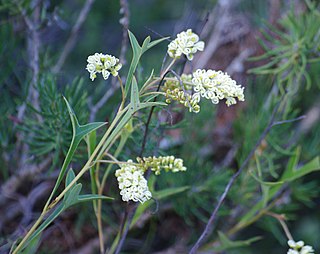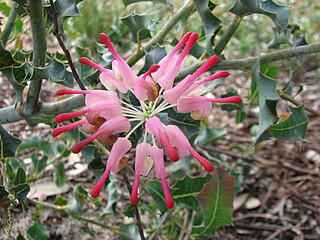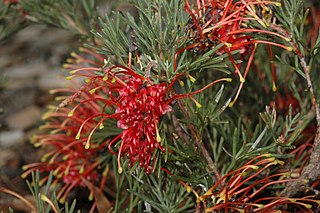
Grevillea petrophiloides, commonly known as pink pokers, rock grevillea or poker grevillea, is a species of flowering plant in the family Proteaceae and is endemic to the south-west of Western Australia. It is an erect shrub with divided leaves, the lobes mostly linear, and cylindrical clusters of usually pink to reddish pink and bluish-grey flowers.

Grevillea fililoba is a species of flowering plant in the family Proteaceae and is endemic to a restricted area in the south-west of Western Australia. It is a spreading shrub with soft foliage, divided leaves with narrow linear lobes, and clusters of pink to bright red and white flowers.

Grevillea vestita is a species of flowering plant in the family Proteaceae and is endemic to the southwest of Western Australia. It is an erect, spreading, prickly shrub with lobed leaves, the number and arrangement of lobes depending on subspecies, and more or less spherical to dome-shaped clusters of hairy, white to cream-coloured flowers sometimes tinged with pink.

Grevillea tetragonoloba is species of flowering plant in the family Proteaceae and is endemic to the southwest of Western Australia. It is a dense, erect to spreading shrub, usually with pinnatipartite to almost pinnatisect leaves, the end lobes linear, and clusters of yellowish-brown to fawn flowers with a scarlet to orange-red style.

Grevillea stenomera, commonly known as lace net grevillea, is a species of flowering plant in the family Proteaceae and is endemic to near-coastal areas in the west of Western Australia. It is a rounded, glaucous shrub with pinnatisect leaves with 5 to 15 linear lobes, and pinkish and greenish-yellow flowers with a greenish style.

Grevillea synapheae, commonly known as catkin grevillea, is species of flowering plant in the family Proteaceae and is endemic to the southwest of Western Australia. It is a prostrate to erect shrub usually with divided leaves with 3 to 7 triangular to more or less linear lobes, and clusters of white to creamy yellow flowers.

Grevillea althoferorum, commonly known as the split-leaved grevillea, is a species of flowering plant in the family Proteaceae and is endemic to a restricted area of Western Australia. It is a compact, rounded shrub with sharply-pointed, deeply lobed leaves and dull yellow flowers with a creamy-yellow style.

Grevillea insignis, commonly known as wax grevillea, is a species of flowering plant in the family Proteaceae and is endemic to the south-west of Western Australia. It is an erect, bushy shrub with more or less oblong leaves with seven to seventeen sharply-pointed, triangular teeth, and more or less spherical or cylindrical clusters of cream-coloured flowers ageing to pink.

Grevillea refracta, commonly known as silver-leaf grevillea, is a species of plant in the protea family and is native to northern Australia. It is a tree or shrub usually with pinnatipartite leaves and red and yellow flowers arranged on a branched, downcurved raceme.

Grevillea bracteosa, also known as bracted grevillea, is a species of flowering plant in the family Proteaceae and is endemic to the south-west of Western Australia. It is an erect to spreading shrub usually with linear leaves, and oval to more or less spherical clusters of glabrous pale green to greenish-pink flowers with a pink or white style.

Grevillea amplexans is a species of flowering plant in the family Proteaceae and is endemic to the Mid West region of Western Australia. It is a spreading shrub with arching branches, stem-clasping, sharply-pointed, lobed or toothed leaves and white to cream-coloured flowers.

Grevillea calliantha, commonly known as Foote's grevillea, Cataby grevillea or black magic grevillea, is a species of flowering plant in the family Proteaceae and is endemic to a restricted part of the south-west of Western Australia. It is a spreading, compact shrub with pinnatipartite leaves with linear lobes, and pale yellow to apricot-coloured flowers with a maroon-black to reddish style.

Grevillea coccinea is a species of flowering plant in the family Proteaceae and is endemic to the south of Western Australia. It is a low-lying or sprawling shrub with narrowly wedge-shaped to linear leaves and white, cream-coloured, and red or yellow flowers.

Grevillea delta is a species of flowering plant in the family Proteaceae and is endemic to restricted area in the south-west of Western Australia. It is a bushy, spreading shrub with hairy branchlets, divided leaves with linear lobes, and groups of red flowers with a red, green-tipped style.

Grevillea obliquistigma is a species of flowering plant in the family Proteaceae and is endemic to the south-west of Western Australia. It is a spreading shrub with linear leaves, and conical to cylindrical clusters of creamy-white to yellowish cream-coloured flowers, sometimes tinged with pink.

Grevillea patentiloba is a species of flowering plant in the family Proteaceae and is endemic to the south-west of Western Australia. It is a prostrate to erect, spreading to straggling shrub with divided leaves, and down-turned clusters of red to deep pink and cream-coloured to bright yellow flowers with a red to deep pink style.

Grevillea pyramidalis, commonly known as the caustic bush, is a species of flowering plant in the family Proteaceae and is endemic to north-western Australia. It is an erect, spindly shrub or small tree with simple linear or pinnatisect leaves with linear to narrowly egg-shaped lobes, and white to yellow or cream-coloured flowers.

Grevillea rara, also known as the rare grevillea, is a species of flowering plant in the family Proteaceae and is endemic to a restricted part of the South West region of Western Australia. It is a prostrate, sprawling shrub when young, later a dense, prickly shrub with pinnatisect leaves with linear lobes, and clusters of white to pale pink flowers.

Grevillea shuttleworthiana is a species of flowering plant in the family Proteaceae and is endemic to the south-west of Western Australia. It is a more or less erect shrub with variably-shaped leaves, the shape depending on subspecies, and cylindrical clusters of cream-coloured to yellow or greenish flowers, often held above the foliage.

Grevillea uniformis is species of flowering plant in the family Proteaceae and is endemic to the south-west of Western Australia. It is a shrub with broadly egg-shaped to fan-shaped leaves with sharply tipped teeth or lobes, and more or less spherical clusters of white flowers.




















